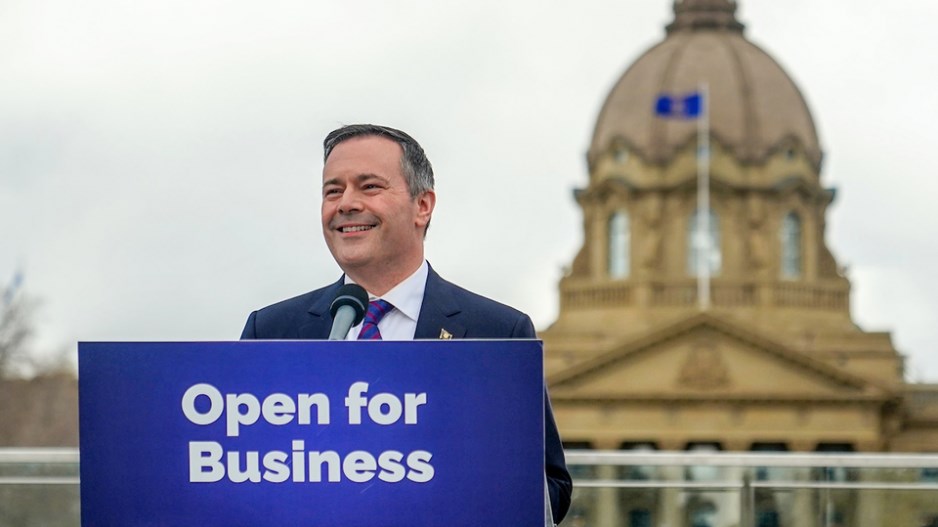The Alberta Court of Appeal has sided with Alberta against the Trudeau government’s federal carbon tax, ruling it is a potential “Trojan horse” that intrudes on provincial territory.
It’s the only provincial appeal court to rule against Ottawa’s constitutional right to impose a federal carbon pricing backstop.
Appeal courts in Saskatchewan and Ontario have essentially upheld Ottawa’s right to impose a federal carbon tax.
In a “good news, bad news” press conference Monday, Alberta Premier Jason Kenney heralded the appeal court’s decision, expressed dismay at the cancellation of the Frontier oil sands project by the proponent, Teck Resources, and announced new restrictions prohibiting the blockading of critical infrastructure, like railways.
The appeal decision came down just one day after Teck Resources (TSX:TECK.B) announced it was taking a $1 billion write-down and walking away from its $20 billion Frontier oil sands project.
And Teck’s announcement came out just hours after the Alberta government had announced it had reached agreements with the Mikisew Cree and Athabasca Chipewyan First Nations to support the Frontier project.
“There is absolutely no doubt it was taken in large part because of regulatory uncertainty and endless delays created by the national government, as well as the general atmosphere – a lawlessness – that we have seen take hold parts of our country and much of our economic infrastructure in the past three weeks,” Kenney said.
He added that the protests and blockades that have taken place across Canada over the last three weeks over the coastal GasLink pipeline in B.C., has already scared off investors.
“I’ve been on the phone with major investors in the past several days who have cancelled, frozen and suspended major projected investments in our economy because of the massive uncertainty created by the appearance of anarchy in parts of this country,” Kenney said.
Ironically, however, some are reading Teck’s rationale for withdrawing its project, at least in part, as a rebuke to the Kenney government’s watering down of climate change policies – notably the cancellation of an economy wide carbon tax.
Teck CEO Don Lindsay said in a letter to the federal environment minister that “investors and customers are increasingly looking for jurisdictions to have a framework in place that reconciles resource development and climate change, in order to produce the cleanest possible products. This does not yet exist here today and, unfortunately, the growing debate around this issue has placed Frontier and our company squarely at the nexus of much broader issues that need to be resolved.”
Under the Rachel Notley government, Alberta had implemented one of the most aggressive climate action policies in Canada. It included an economy-wide carbon tax, a phase-out of coal power and cap on emissions from the oil sands.
Kenney scrapped the broader carbon tax, although he kept a $30 per tonne tax on heavy emitters. He also has not moved to scrap the cap on oil sands emissions or the move to phase out coal.
But because he scrapped the broader carbon tax for consumers, the federal backstop applies. Kenney’s government appealed the federal tax on the grounds it is unconstitutional and on Monday, February 24, the Alberta Appeal Court sided with him.
It found Ottawa’s carbon tax to be a potential “constitutional Trojan horse” that could introduce further intrusions in Alberta’s provincial purview.
“Buried within it are wide ranging discretionary powers the federal government has reserved unto itself,” the court writes. “Their final shape, substance and outer limits have not yet been revealed.
“Almost every aspect of the provinces’ development and management of their natural resources, all provincial industries and every action of citizens in a province would be subject to federal regulation to reduce GHG emissions.”
Ottawa has not yet said whether it plans to appeal the decision to the Supreme Court of Canada, but it’s hard to imagine a scenario where it wouldn’t.
Kenney said his government agrees that it must enact policies that address greenhouse gas emissions.
“We agree with the need to reduce emissions across our economy and in our energy sector, but we must be allowed to do it our own way,” Kenney said. “We will not tolerate Ottawa deciding the future of Alberta’s economy.”
Kenney said he was happy to see Ontario Provincial Police finally moving in to arrest protesters and dismantle Mohawk barricades at a railway crossing near Belleville, Ontario that has paralyzed rail traffic for nearly three weeks.
Even so, Kenney said he plans to table a new bill tomorrow, as part of the Throne speech, that will create “new stiff penalties for anyone who riots on or seeks to impair critical economic infrastructure, including railways, in the province of Alberta.”




